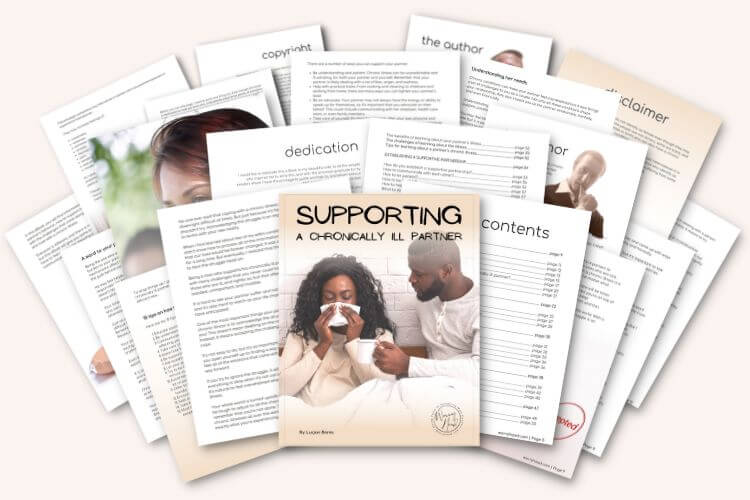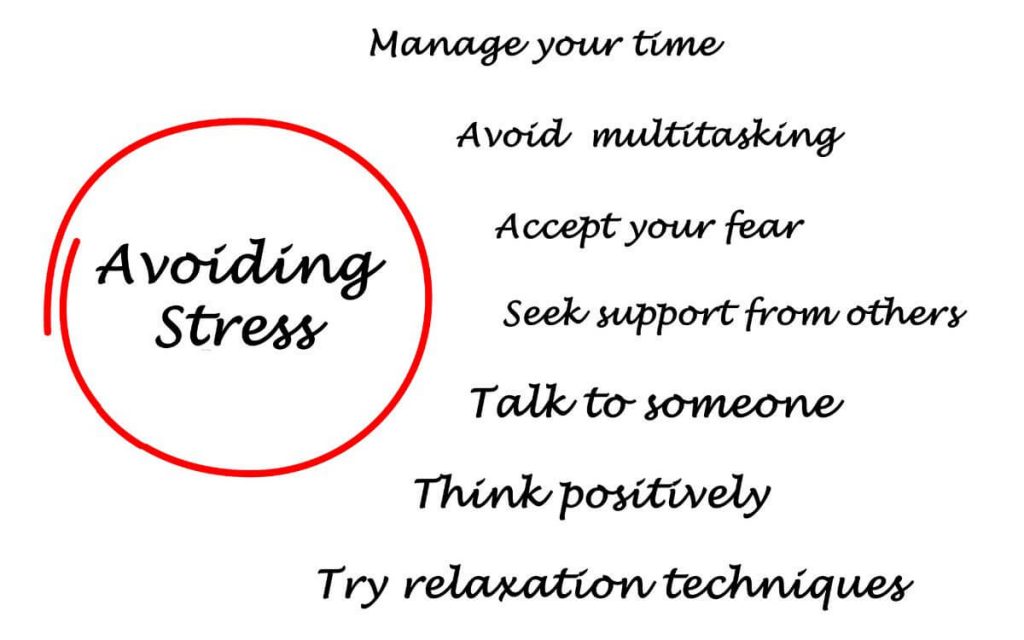How to help your partner break the vicious cycle of long-term illness and stress?
Knowing how to break the vicious cycle of long-term illness and stress can be tough. Your partner may feel like they are stuck in a never-ending cycle of feeling sick and stressed out. It makes you feel helpless and can be frustrating trying to figure out how to help.
Chronic illness and chronic stress go hand-in-hand.
When your partner is dealing with an illness, it can be very stressful. This can cause their immune system to weaken, which can make them more susceptible to getting sick. Stress can make the illness worse, which in turn creates more stress.
It can feel like a never-ending cycle that’s impossible to break.
Breaking the vicious cycle of chronic illness and stress takes time and effort. But with your support, your partner can start to feel better and lead a more fulfilling life.
Educate yourself about your partner’s illness. Communicate, be patient, supportive, and understanding. Avoid arguing unnecessarily. Try not to be too critical, instead, respect their decisions even if you don’t agree with them. Give your partner space when they need it. Help them relax and take care of themselves.
My wife’s long-term illnesses and stress.
My wife suffered a lot of childhood trauma which made her feel anxious throughout her early years all the way to her adulthood. Fast forward a few decades, at the age of 38 she was diagnosed with endometriosis, and the following year, with fibromyalgia.
Endometriosis is a debilitating condition that is characterized by the presence of endometrial-like tissue outside of the uterus. This tissue can grow on the ovaries, fallopian tubes, and other organs in the pelvis. The main symptom of endometriosis is pelvic pain, which can be severe.
Endometriosis prevented my wife from having children and family. Knowing that she will never become a biological mother was a big blow to her self-esteem. The chronic pain and fatigue associated with the condition took a toll on her mental health.
Fibromyalgia, on the other hand, is a chronic disorder that causes widespread pain and tenderness in the muscles, joints, and tendons. People with fibromyalgia often experience fatigue, sleep problems, and difficulty concentrating.
The chronic pain and fatigue associated with fibromyalgia can be very debilitating. My wife often struggles to do everyday tasks because of the pain and fatigue.
Naturally, the whole situation took a toll on our marriage, and even though I have never given up on my wife, or made her feel like a burden, she did. That’s just the nature of things. People who live with long-term health conditions often feel responsible for the stress that their illnesses put on their loved ones.
But I was determined to help my wife break the vicious cycle of chronic illness and stress, and even helped her go through many suicidal thoughts, and two attempts. She still occasionally self-harms, but not to the extent she used to.
If you want more in-depth information about how to support your partner with her chronic conditions and how to cope with the new normal in your relationship, I wrote a “Supporting a Chronically Ill Partner” e-Book.
You can get the 1st Chapter of the e-Book for FREE, and if you like it, you’ll get a Whopping 33% Discount on the Whole Book, plus discounts on other helpful tools. You have nothing to lose but a lot to gain!
The first chapter alone contains a lot of information for both of you about acknowledging the struggles, including:
- A word to your partner.
- A word to you.
- Stepping on eggshells.
- Understanding her needs.
- How to acknowledge having a chronically ill partner?
- Acknowledging can be hard.
- 15 tips on how to do it!
Get the 1st Chapter FREE!
Chronic Illness for Partners

An illness and stress.
Chronic conditions and stress always coexist together. The reason being is when an individual is constantly ill, it takes a toll on their mental state. In most cases, individuals who are chronically ill also suffer from chronic stress.
The effects of chronic stress on health are well documented. Nearly a third of people living with a chronic condition suffer from some kind of mood disorder. Most commonly, people experience general anxiety and depression.
In my wife’s case, her advanced stage IV deep infiltrating endometriosis and fibromyalgia disorder caused her to develop also panic disorder, and Obsessive-Compulsive Disorder (OCD). The repetitive flare-ups my wife experiences made her feel anxious over the unknown future, and she feels depressed due to the loss of her health and fitness.
If your partner suffers from general anxiety, depression, or OCD, it is important to be supportive and understanding. Listen to your partner when they need to vent. Avoid being critical, and do not try to fix their problems. Instead, offer a shoulder to cry on and be an emotional support system.
In my wife’s case, I make sure that I am always available to listen to her. I do not try to fix her problems because I know that she is capable of handling them herself. But I am always there for her whenever she needs me.
Chronic stress can also lead to physical health problems. Over time, chronic stress can take a toll on the body and lead to serious health conditions such as heart disease, stroke, cancer, and obesity.
I believe, in my wife’s case, that the chronic stress she experiences has contributed to the development of her endometriosis, and later on, fibromyalgia.
If your partner is under a lot of stress, help them relax and take care of themselves. Get a coffee together, go on walks, or take vacations. Whatever you do, make sure that you are spending quality time together without stress.
In my wife’s case, we try to go for a walk in the woods at least once a week. We also make sure to go on vacations as often as we can. Breaking the vicious cycle of long-term illness and stress is not easy, but it is possible with the right support system.
The vicious cycle of long-term illness and stress.
Why do long-term conditions affect mental health?
Chronic stress can have a negative impact on your partner’s mental health. The reason being is that when someone is constantly ill, it takes a toll on their mental state. In most cases, people who are chronically ill also suffer from chronic stress.
The effects of chronic stress on your partner’s mental health depend on the circumstances and character of your partner. The vicious cycle of long-term illness and stress can be broken if you are an understanding and supportive partner.
Breaking the vicious cycle of long-term illness and stress is not easy, but it is possible with the right support system. If your partner suffers from a chronic condition, make sure to be there for them and offer emotional support.
Help your partner relax and take care of themselves by getting a coffee together, going on walks, or taking vacations. Whatever you do, make sure that you are spending quality time together without stress.
Vicious cycles will reoccur if an individual experiences chronic stress, so it is important to be mindful of the situations and people that may trigger your partner’s anxiety. By allowing your partner to vent to you, and being an overall supportive shoulder, you can help break the cycle together.
The vicious cycle of long-term illness and stress consists of:
- the triggers that trigger anxiety and stress
- the stress that triggers flare-ups of symptoms and pain
- the symptoms and pain that trigger fatigue
- the fatigue that may become chronic
- chronic fatigue which causes anxiety over the unknown
- the never-ending cycle also causes depression

Breaking the chronic illness and chronic stress cycle.
How can you help your partner with their cycle of long-term illness and stress?
To break the vicious cycle of long-term illness and stress, you need to take components of it out. For instance, if your partner feels fatigued, help them relax which is going to de-stress your partner, and the anxiety will be avoided.
One of the most effective ways to manage stress and chronic illness is to prevent stress by avoiding the triggers.
Every chronically ill person has their own unique triggers. It is important to be aware of what stresses your partner out and try to avoid those triggers.
Some common triggers include:
- negative thoughts
- physical pain
- certain people or situations
- lack of sleep
- not having a routine
Having an understanding and supportive partner is key to breaking the vicious cycle of long-term illness and stress. As I always say – “the best gift you can ever give to a chronically ill partner is your unconditional love and support.
15 tips on how to break the vicious cycle of long-term illness and stress.
To finish off, I give you my list of 15 ways how to break the vicious cycle of long-term illness and stress:
- Understand your partner’s illness and what they are going through.
- Educate yourself on chronic stress and how it affects your partner’s mental health.
- Be an understanding and supportive partner by listening to your partner vent and offering emotional support.
- Help your partner relax and take care of themselves by getting a coffee together, going on walks, or taking vacations.
- Avoid triggering your partner’s anxiety by being mindful of their triggers and trying to avoid them.
- Help break the cycle by allowing your partner to vent to you and being an overall supportive shoulder.
- Take some components of the vicious cycle out by helping your partner relax when they feel fatigued.
- One of the most effective ways to manage stress and chronic illness is to prevent stress by avoiding the triggers.
- Try to be understanding and supportive when your partner is going through a tough time.
- Always be there for your partner and offer them emotional support.
- Help your partner relax and take care of themselves by doing things together that they enjoy.
- Avoid triggering your partner’s anxiety by being mindful of their triggers and trying to avoid them.
- Be an understanding and supportive partner by listening to your partner vent and offering emotional support.
- Help break the cycle of long-term illness and stress by being an overall supportive shoulder for your partner.
- Offer unconditional love and support to your chronically ill partner to help them through tough times.
Get the 1st Chapter FREE!
Chronic Illness for Partners



About Me
Hi, I’m Lucjan! The reason why I decided to create this blog was my beautiful wife, who experienced a lot of pain in life, but also the lack of information about endometriosis and fibromyalgia for men…
